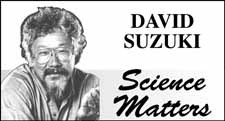Many people were rightly outraged at recent reports that coins thrown into a whale pool may have contributed to the death of a baby beluga at the Vancouver Aquarium. Regardless of the cause of one-year-old Nala's death - or of what one thinks of whales in captivity - it was heartening to see that so many people cared.
But it would be nice to see that much attention paid to the stuff we humans throw into the belugas' natural Arctic habitat. We're killing more than just one baby beluga with our irresponsible actions.Of the seven beluga populations in Canada, the Committee on the Status of Endangered Wildlife in Canada (COSEWIC) has listed three as endangered, one as threatened, and one as being of special concern. The other two are not at risk. Along with hunting, the whales are threatened by "habitat loss from shore development, build-up of toxic contaminants and disturbance by commercial shipping, ice breaking and whale watching activities." Oil exploration and drilling in the Arctic could increase the risk.
Belugas aren't the only ones we're harming with the way we treat our oceans. We're hurting ourselves and our children and grandchildren as much as we're hurting the fish, whales, corals, and other life in the seas. And just as we can refrain from tossing coins into an aquarium whale pool, we can stop throwing our garbage into the oceans and we can curtail some of the other activities that put marine life and our own lives at risk.
Just consider the giant garbage patches swirling in the Pacific and other oceans. All that plastic and debris doesn't get there by itself. Some of it comes from nets and garbage dumped from ships, but much of it comes from things discarded on land that get washed or blown into the oceans. These plastics and toxins end up in the stomachs of many marine animals, causing great harm including death. Some of the toxins can also work their way into humans, as we eat the fish and other sea creatures. In fact, all of us carry amixture of human-manufacturedcontaminants that have entered our bodies through the food we eat, the water we drink, the air we breathe, and the products and elements we come in contact with every day.
Right now we're also pouring millions of litres of oil into the ocean, in the Gulf of Mexico. This illustrates how everything is interconnected - even our problems. The disaster in the gulf is a direct consequence of our overconsumption and reliance on diminishing fossil fuels for energy. And that in turn is creating problems beyond pollution in the ocean. Our use of fossil fuels is also causing air pollution and is contributing to the greatest threat facing humanity, climate change.
What this should teach us is that all of us can and must do our part to turn it around. We need to drive less, consume less, use fewer plastic products, throw away less, recycle and compost more, and make sure the products we use are as environmentally sustainable as possible. These individual actions can make a powerful difference, especially because, as more people do their part, this becomes the socially "normal" way to live.
Just look at some of the changes we've adopted in relatively short time periods: decreased rates of smoking where regulations and information have made the habit socially unacceptable, more people and stores shunning plastic grocery bags, more cities bringing in recycling and composting programs, more people cycling The list goes on.
Of course, it will take more than just making changes in our own lives. Action is needed in political and corporate realms as well. But remember that individual people wield the power in those institutions, and they must also respond to societal pressure. That's especially true of the politicians who are elected to represent the interests of all citizens. We must take democracy more seriously, being politically active to make environmental action a major part of the criteria we vote for. We need regulation and taxation to discourage what we don't want and to encourage what we want.
What we do in our lives affects our entire world - its soils, its rivers, lakes and oceans, its atmosphere, and all the living things that share our planet. We must understand that when we do something that harms the beluga, or the grizzly, or the spotted owl, we are also harming ourselves.Learn more at www.davidsuzuki.org.




